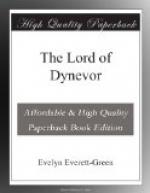Perhaps there was something in the expression of those two dark faces that told its tale to one silent spectator of the meeting between the Welsh and English; for as the party united forces and pushed onwards and upwards towards the wild ravine where the haunt of the wolf lay, the twin brothers heard themselves addressed in their own language, and though the tones were sweet and silvery, the words had a ring of passionate earnestness in them which went straight to their hearts.
“Methinks I am not mistaken in you, sons of Dynevor. You have not willingly left your mountain eyry for these halls where the proud foeman holds his court and sits in judgment upon those who by rights are free as air. I have heard of you before, Llewelyn and Howel ap Res Vychan. You are not here, like your brethren, half won over to the cause of the foe; you would fight with the last drop of your blood for the liberty of our country.”
Turning with a start, the brothers beheld the form of a slight and graceful maiden, who was pushing her palfrey up beside them. She appeared to be about their own age, and was very beautiful to look upon, with a clear, dark skin, large, bright eyes, now glowing with the enthusiasm so soon kindled in the breast of the children of an oppressed people — a people thrilling with the strange, deep poetry of their race, which made much amends for their lack of culture in other points.
Llewelyn and Howel, learning caution by experience, scarce knew how to respond to this appeal; but the girl met their inquiring glances by a vivid smile, and said:
“Nay, fear me not. I am one of yourselves — one of our country’s own children. Think not that I am here of my own free will. I deny not that I have learned to love some amongst our conqueror’s children and subjects, but that does not make me forget who I am nor whence I have come. Let us talk together of our country and of the slender hopes which yet remain that she may gird herself up and make common cause against the foe. Oh, would that I might live to see the day, even though my life might pay the forfeit of my father’s patriotism. Let Edward slay me — ay, and every hostage he holds in his hand — so that our country shakes off the foreign yoke, and unites under one head as one nation once again.”
These words kindled in the breast of the twin brothers such a glow of joy and fervour as they had not known for many a weary day. They made room for Arthyn to ride between them, and eager were the confidences exchanged between the youthful patriots as they pursued their way upwards. Little they heeded the black looks cast upon them by Raoul Latimer, as he saw Arthyn’s eager animation, and understood how close was the bond which had thus quickly been established between them and the proud, silent girl whose favours he had been sedulously trying to win this many a day.




